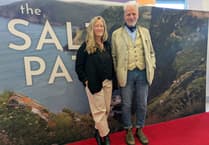THE Home Guard were not “old duffers and amateurs” but highly skilled soldiers, according to documents found in a Truro attic.
Established in 1940, the Home Guard was made up of local volunteers who were ineligible for regular military service. It was famously portrayed in the sitcom Dad’s Army, from 1968 to 1977, as a group of elderly, unpaid soldiers who “couldn’t get anything right”.
But historians say papers, which originally belonged to Major James Webster, commanding officer of two Home Guard battalions in Ipswich, show the men underwent extensive training to serve their country.
Maj Webster’s granddaughter, Helen Mitchell, discovered the papers while clearing her attic and admits she very nearly disposed of the documents. “I brought the box home after my dad died, and never really went through the contents,” she said.
“It sat up there for ten years, and when I did look at it, I thought, ‘I'm never going to sit down and read any of this.’ I was very close to binning it, but something stopped me. However, I didn’t want to stuff it all back in the loft for another ten years, so I advertised it on Facebook in Home Guard groups in June, and was inundated with interest.”
Having given the box to a Probus Home Guard enthusiast who planned to digitise the contents - which included a file labelled “Secret” - Helen later discovered the hard copies had been donated to the Great War Huts military museum in Bury St Edmunds, Suffolk.
In contrast to the Dad's Army depiction of bungling volunteers, the papers showed the Home Guard ran on the manpower of experienced old soldiers, reserves, young recruits and those deemed too important to serve due to their jobs. This applied to Maj Webster, manager of an Ipswich-based engineering business.
“A lot of chaps were also local businessmen - doctors, teachers, engineers - which meant that straight away, you had a ready-made source of potential recruits,” said museum co-founder Taff Gillingham.
“There were old soldiers who were experienced in different wars - like the First World War or the Boer War. You also had the manpower of fellows who were too young to fight - the 16- and 17-year-olds – and fit young fellows in jobs which exempted them joining the forces.
“By 1943, they were not much different to the professionals.”
Taff added: “The volume of paperwork shows how much training they had and at what an advanced level. I think the fascinating thing is how many times a year different exercises were staged. They had training on lots of different weapons and road-blocking - how they were going to get the Germans to stand down.”
Helen is “delighted” the papers have been saved for the benefit of future generations. “My grandfather never talked about the Home Guard,” she said. “Now I am being chased by people who want to talk to me about it, which has raised fond memories of my parents and grandparents. You get so caught up in the day-to-day, it’s a nice feeling when someone stops you and makes you think about your ancestry.”





Comments
This article has no comments yet. Be the first to leave a comment.